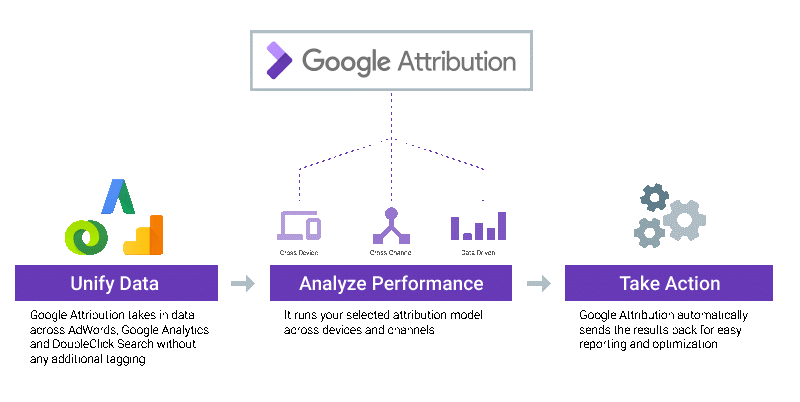When Google announced their intention to ‘solve the attribution problem’ for advertisers by moving away from the last-click attribution model last week at Google Marketing Next, the volume of chatter around the buzzword of attribution multiplied.
Google supercharged their attribution modelling capabilities in 2014 with the acquisition of Adometry, a company that specialises in measuring the impact of marketing. These advanced attribution capabilities are now available to the biggest advertisers as the premium solution; Attribution 360.
Google Attribution, the solution announced last week, is a simplified version which enables “every marketer to measure the impact of their marketing across devices and cross-channel - all in one place.”1
Why this is good news for marketers
Simply: because existing attribution models have their fair share of drawbacks, as cited by Google:
- They are difficult to set up
- They lose track of the customer journey when people switch between devices
- They aren’t well integrated
- It is a challenge to use attribution results to take action in marketing
For years, marketers have had to make do with last-click attribution models which don’t take into account the various touch points a customer has with a company along their path to purchase. Last-click attribution is an inadequate measuring tool in a world of multichannel and multi device interactions. The non-existent or limited integration between various marketing and advertising technologies means managing, analysing and generating actionable insights from the large amounts of customer data in separate systems either requires software development skills, or is overly time consuming and difficult. Furthermore, due to conflicting data, the end-result does not even necessarily ensure data accuracy and therefore accountable attribution.
Enter Google Attribution
Google Attribution aims to simplify the problems of multi-channel and multi-device attribution by integrating data from Google AdWords, Google Analytics, search ads, display ads, organic search, email, affiliates, social and direct visits, all in one place. Giving marketers one single view of the complex online and offline path to purchase will enable them to easily take action, optimise budgets and increase marketing effectiveness.
How Google Attribution works
There is a huge amount of data available to Google – from AdWords, Analytics and more. Google Attribution looks to unify data from these tools and deliver the clear insights marketers need to improve advertising performance. Attribution will simplify the challenge of importing data, eliminating the need for retagging and ensuring that data is complete and consistent.

Google Attribution will use machine learning to determine how much credit marketers should assign to their various digital touch points. “It creates a prediction model that learns by weighting a set of touchpoints on how likely a user is to purchase something,” Says Babak Pahlanvan, Senior Director of Product Management for Analytics and Measurement at Google, “The presence and absence of marketing touch points across all channels and across all campaigns will either decrease of increase the likelihood of conversion.”2
Google promises that Attribution is not just a reporting change either, but a completely new view of data which provides a more accurate view of your business. And even better, search advertisers who switch to data-driven attribution get higher conversion rates with no added expenditure, according to Bill Kee, Group Product Manager of Attribution at Google.
However smaller volume businesses, such as B2B, are unlikely to see the benefit of data-driven attribution
While Google Attribution is available to all, it is unlikely that all will benefit from the data-driven attribution model, with the minimum requirements needed likely to cut out smaller companies. To use data-driven attribution in the Google Analytics 360 suite, an advertiser must meet the minimum conversion threshold (400 conversions per conversion type with a path length of 2+ interactions, and 10,000 paths in the selected reporting view). There is also a requirement to have either Ecommerce Tracking or Goals set up. It is likely that these minimum requirements will exist within Google Attribution too, so unfortunately many SMBs will still be unable to benefit from Google’s data driven offering.
Understanding the full customer journey
Google has shone a light on the importance of data which provides an accurate view of all touchpoints of the customer buying cycle. At a time when it’s estimated that 86% of customers will pay more for a better customer experience, knowing and understanding the customer has never been more important.3
Google Attribution is currently in beta mode and will be rolled out to more advertisers over the coming months. We are looking forward to seeing how Infinity call data will look in this new view, and will be keeping an eye on further information on Google Attribution.
References
1. “Powering ads and analytics innovations”, Google Blog, (May 23, 2017)
2. “How Google plans to kill Last-Click Attribution”, Adage, (May 23, 2017)
3. “Customer Experience Impact Report”, Oracle, (n.d.)